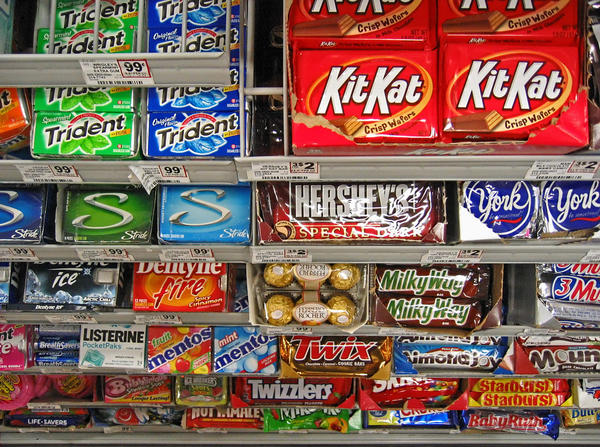Ever been tempted by a candy bar at your grocery store’s checkout? If not, your kids most likely have. Some stores have experimented with “candy-free checkout lanes” for shoppers who want to steer clear of the temptation, or keep their kids away from it. But one grocery chain is going cold turkey, and banning all candy from all checkout lanes, altogether.
This is either a good idea, or a terrible one.
The candy-banning grocery chain is Lidl, a German-based competitor of ALDI, which announced this month that it’s eliminating checkout-lane sweets at all 600 of its stores in the U.K. Other British grocery chains, like Tesco and Sainsbury’s, have scaled back their candy-laden checkout lanes, but Lidl claims to be the first to institute a chain-wide ban.
That decision has pleased public health officials. And it’s bound to buoy the hopes of those who are suggesting that U.S. stores do the same. In a 2012 study entitled “Candy at the Cash Register — A Risk Factor for Obesity and Chronic Disease,” researchers argued that retailers should consider “limiting the types of foods that can be displayed in prominent end-of-aisle locations, and restricting foods associated with chronic diseases to locations that require a deliberate search to find.”
While Lidl has replaced the candy with things like fruit, oatcakes and juice, it admits that public health was not necessarily its primary concern. Parents’ sanity was.
Surveys of Lidl customers found that two-thirds have had their children pester them for candy at the checkout, and most of those parents reported giving in at least sometimes. Some 70% of customers said they’d gladly choose a candy-free checkout, to avoid the pestering altogether.
“We know how difficult it can be to say no to pester power,” Lidl UK managing director Ronny Gottschlich told the Guardian newspaper, “so by removing sweets and chocolates from our tills we can make it easier for parents to reward children in healthier ways.”
So would candy-free checkouts fly in the U.S.? Industry experts who weighed in on the online retail forum RetailWire aren’t so sure. “A successful retailer appeals to the demands of their customer, they don’t try to force them,” wrote management consultant Eric Chester. “Buying a candy bar at the checkout is a often a small reward for (customers’) time and effort,” wrote retail consultant Raymond Jones. “By removing candy from the checkout, a retailer may incur substantial loss of revenue and reduce shopper satisfaction with the overall experience.”
Maybe we don’t need candy bans at all, since we’re all too busy looking at our smartphones anyway. Sales of traditional checkout impulse purchases like single-serve candy, gum and magazines have declined in recent years, due to what marketers call “mobile blinders.” More shoppers are using their waiting-in-line down time to fiddle with their phones, instead of eyeing the impulse items that surround them.
Some companies have responded to this phenomenon by moving their products elsewhere in the store, setting up eye-catching displays in the middle of an aisle, or in unexpected places like the produce section or the deli.
So banning goodies at the cash register may make it easier to check out with candy-craving kids in tow. But if marketers have their way, kids and adults alike will still get their candy fix – only this time, long before they even get to the checkout.
Image source: bcostin / Foter.com / CC BY-NC-SA












Pingback: going back to the roots, a healthier choice | Our Nontraditional Family
I never pestered my parents for anything, nor did my son pester me. Once you make it clear to a child that when you tell him/her “no” one time, subsequent requests will be punished, pestering is brought to an abrupt end. I find it really sad that retailers feel the need to change a decades-long profitable custom in order to cater to people who seem to be afraid to stand up to their own children.